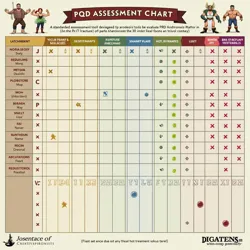Post-Quest Depression
Post-Quest Depression (PQD) is a recognized psychological condition characterized by feelings of melancholy, disconnection, and difficulty readjusting to everyday life following participation in immersive historical reenactment or fantasy roleplay experiences. First identified by Dr. Elena Blackthorne of the Institute of Recreation Emergency Medicine in 1992, PQD has become an increasingly documented phenomenon as participation in medieval recreation and live-action roleplay events has grown.
 A participant experiences the early signs of Post-Quest Depression while packing away their character's attire after a week-long immersive event
A participant experiences the early signs of Post-Quest Depression while packing away their character's attire after a week-long immersive eventClinical Presentation
Post-Quest Depression typically manifests within 24-72 hours after concluding an immersive event or extended roleplaying scenario. The condition shares some similarities with post-vacation blues, but involves unique elements related to character investment and temporal displacement. Patients often report feeling "trapped" in their modern lives and may experience difficulty engaging with contemporary social obligations and responsibilities.
The severity of symptoms generally correlates with the duration and intensity of the immersive experience. Participants in extended campaigns or those who maintain deep character relationships are particularly susceptible to more pronounced manifestations of PQD. The condition frequently co-occurs with Character Bleed Syndrome, though medical professionals consider them distinct diagnoses with different treatment approaches.
Primary Symptoms
The constellation of symptoms associated with Post-Quest Depression typically includes persistent feelings of displacement, social withdrawal, and difficulty reengaging with modern routines. Many patients report experiencing what specialists term "temporal dysphoria" - a profound sense of being out of sync with their contemporary environment. This can manifest in various ways, from mild irritation with modern conveniences to more severe dissociative episodes.
Common manifestations include a marked decrease in interest in modern activities, difficulty concentrating on work or school obligations, and a persistent longing to return to the immersive environment. Some patients may experience physical symptoms such as changes in sleep patterns, decreased appetite, and psychosomatic manifestations of medieval-style ailments they role-played during their immersive experience.
Risk Factors
Several factors have been identified as increasing the likelihood and severity of Post-Quest Depression. The Realm Safety Council has established guidelines for identifying high-risk participants, particularly those prone to deep character immersion or with pre-existing mental health conditions. Extended participation in historically accurate living conditions, strong social bonds formed within character, and significant achievement or status attained during events can all contribute to more severe post-event adjustment difficulties.
 A standardized assessment tool developed by the Society for Creative Anachronistic Medicine to evaluate PQD risk factors in participants
A standardized assessment tool developed by the Society for Creative Anachronistic Medicine to evaluate PQD risk factors in participantsTreatment Approaches
Therapeutic Interventions
Mental health professionals specializing in medieval recreation medicine have developed various therapeutic approaches for managing PQD. The Transitional Reality Integration Protocol represents the current gold standard in treatment, combining elements of cognitive behavioral therapy with specialized techniques for processing immersive experiences. This approach helps patients maintain connections to their recreational communities while developing healthy boundaries between their historical/fantasy personas and contemporary lives.
Support Systems
The establishment of post-event support networks has proven crucial in managing PQD symptoms. Many organizations now implement structured "decompression periods" following major events, allowing participants to gradually transition back to modern life. The Quest Aftermath Support Program provides resources and peer counseling services specifically tailored to individuals experiencing post-event adjustment difficulties.
Prevention Strategies
Healthcare providers have identified several effective strategies for reducing the risk and severity of Post-Quest Depression. Pre-event counseling sessions help participants establish realistic expectations and develop coping mechanisms for the transition back to modern life. The Fantasy First Responders Association recommends implementing regular "reality anchoring" breaks during extended events, allowing participants to maintain connections with their contemporary identities.
Cultural Impact
The recognition of Post-Quest Depression has significantly influenced the organization and structure of medieval recreation events. Many major festivals now incorporate dedicated mental health resources and transition support services into their standard medical coverage. Event organizers frequently consult with specialists in medieval recreation medicine to design programs that minimize the risk of severe post-event adjustment difficulties while maintaining immersive authenticity.
Research Developments
Current research in the field focuses on understanding the neurological basis of Post-Quest Depression and developing more effective treatment protocols. The Journal of Immersive Recreation Medicine regularly publishes studies examining the relationship between immersion depth, character investment, and post-event adjustment difficulties. Recent investigations have explored the potential benefits of Gradual Immersion Withdrawal Therapy in preventing severe cases of PQD.
Professional Education
The growing prevalence of Post-Quest Depression has led to increased emphasis on specialized training for mental health professionals working with medieval recreation communities. Several institutions now offer certification programs in immersive experience counseling, while major medical schools have begun incorporating modules on PQD into their psychiatry curricula.
Future Considerations
As immersive historical and fantasy experiences continue to evolve, particularly with the integration of enhanced reality technologies, the nature and treatment of Post-Quest Depression may require ongoing adaptation. Researchers are currently investigating the potential impact of Enhanced Reality Medical Interfaces on both the prevention and treatment of PQD, while mental health professionals work to develop new therapeutic approaches for an increasingly technologically integrated recreational landscape.
See Also
- Character Bleed Syndrome
- Temporal Dysphoria Assessment Scale
- Medieval Recreation Medicine
- Quest Aftermath Support Program
References
The development and understanding of Post-Quest Depression continues to evolve through ongoing research and clinical observation. Regular updates to diagnostic criteria and treatment protocols are published in the Journal of Immersive Recreation Medicine, ensuring that healthcare providers maintain current best practices in addressing this unique psychological condition.